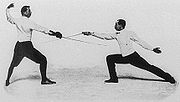
Fencing at the 1900 Summer Olympics
Encyclopedia

1900 Summer Olympics
The 1900 Summer Olympics, today officially known as the Games of the II Olympiad, was an international multi-sport event which was celebrated in 1900 in Paris, France. No opening or closing ceremonies were held; competitions began on May 14 and ended on October 28. The Games were held as part of...
, seven fencing events were contested. Fencers from 19 nations competed.
Medal summary
| Épée |
|||
| Masters épée |
|||
| Amateurs-masters épée |
|||
| Foil |
|||
| Masters foil |
|||
| Sabre |
|||
| Masters sabre |
Weekly summary
The fencing events were spread out over a good deal of time. The competitions began on Monday, 14 May.14-20 May
- The first round of the amateur foil competition was held on 14 May and 15 May. Judging was subjective, a change from the 3-touch format from four years earlier. 37 of the 54 fencers advanced, including some who had nominally lost their bouts (when the judges felt that both fencers displayed good skill) and excluding some who had nominally won.
- The quarterfinals, repechage, and semifinals were also held for the foil event in the first week. The quarterfinals and repechage were again judged subjectively, but the semifinal was a round-robin pool format with matches won or lost counting towards advancement to the final. The only non-French fencer to advance past this stage was Rudolf BroschRudolf BroschRudolf Brosch was an Austrian Olympic fencer. He competed in the individual foil event at the 1900 Summer Olympics.-References:...
of Austria.
21-27 May
- The foil competition continued with the consolation pool and the final on 21 May. These round-robin pools determined the top 16 places in the tournament, with the top 7 going to France as Brosch finished last in the final.
- The first two rounds, the repechage, and the first half of the semifinals of the masters foil event were held this week. Again, early rounds were judged subjectively but the semifinal used match results.
28 May-3 June
- The masters foil competition concluded with the second half of the semifinals on 28 May and the consolation and final rounds on 29 May. France again swept the medals, though Italians Antonio ConteAntonio Conte (fencer)Antonio Conte was an Italian fencer who competed in the late 19th century and early 20th century.Conte was born in Minturno. He participated in Fencing at the 1900 Summer Olympics in Paris and won the gold medal in the masters sabre, defeating fellow Italian fencer Italo Santelli in the...
and Italo SantelliItalo SantelliItalo Santelli was an Italian fencer who is considered to be the "father of modern sabre fencing".-Early life:...
made strong showings, with 4th and 7th places, respectively. - Épée made its Olympic debut, with the amateur event beginning with part of the first round on 1 June and 2 June. All rounds of the event consisted of round-robin pools.
4-10 June
- The épée competition continued with the second half of the first round, the quarterfinals, and the semifinals. Ramón FonstRamón FonstRamón Fonst Segundo was a Cuban fencer who competed in the early 20th century. He was born and died in Havana....
of Cuba and Eduardo CametEduardo CametFrancisco Carmelo Camet, better known as Eduardo Camet was an Argentine fencer who competed in the late 19th century and early 20th century. He participated in Fencing at the 1900 Summer Olympics in Paris and successfully fought his way thorough the preliminary heats, the quarter finals and the...
of Argentina joined 7 French épéeists in advancing to the final.
11-17 June
- The masters épée competition began on 11 June, with the semifinals on 13 June. France dominated the competition, taking all of the finals spots.
- On 14 June, the finals of both the masters and amateur épée events were held. France took its third medal sweep in the masters event, but Fonst took the gold in the amateur event to give Cuba its first Olympic medal.
- An unusual event, a competition between the amateurs and masters in the épée, was held on 15 June. The top four fencers in each class played in a one-day round-robin pool in the amateur-master event. Albert Robert AyatAlbert Robert AyatAlbert Jean Louis Ayat was a French fencer who competed in the late 19th century and early 20th century. He participated in Fencing at the 1900 Summer Olympics in Paris and won the gold medal in the masters épée. He also won the gold medal in the Amateur masters épée final.-References:...
, the winner of the professional event, went undefeated to win the gold medal, but the amateurs took the next three spots, including a silver medal for Fonst to make Cuba one of two nations in 1900 to win a medal with every competition entry (Luxembourg, with a marathon win as their only entry, was the other).
18-24 June
- The first round, semifinals, and final of the amateur sabre event were held. The sabre events were much more internationally balanced than the other two weapons, with 3 Austrians, 2 Hungarians, and 3 Frenchmen making the final. France still took the top two spots, giving the host nation its 5th gold medal in 6 attempts.
- The first round and the semifinals of the masters event of the sabre also took place in the sixth week of fencing competition. In the most international field of the events, the 8 fencers advancing to the final hailed from 5 different nations: Italy, France, Russia, Belgium, and Austria.
25-27 June
- Fencing competition ended with the final of the masters sabre on Wednesday, 27 June. France won no medals in the event, as Conte and Santelli did even better in the sabre than they had in the foil, winning the gold and silver medals in the sabre. Milan NeralićMilan NeralicMilan Neralić was a Croatian fencer who competed in the late 19th century and early 20th century for Austria-Hungary....
of AustriaAustriaAustria , officially the Republic of Austria , is a landlocked country of roughly 8.4 million people in Central Europe. It is bordered by the Czech Republic and Germany to the north, Slovakia and Hungary to the east, Slovenia and Italy to the south, and Switzerland and Liechtenstein to the...
took the bronze.
Participating nations
A total of 276 fencers from 19 nations (including 3 nations not recognized by the IOC) competed at the Paris Games:– Participation not recognized by IOC. – Participation not recognized by IOC. – Participation not recognized by IOC.
Medal table
| 1 | 5 | 5 | 5 | 15 | |
| 2 | 1 | 1 | 0 | 2 | |
| 3 | 1 | 1 | 0 | 2 | |
| 4 | 0 | 0 | 2 | 2 |

